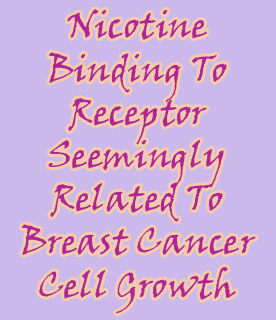
Large epidemiological studies have enlightened about the possible risk for breast cancer due to smoking, but lack molecular biology studies on the way it works. For evaluating how nicotine works on the cellular level to promote breast cancer growth, the experts examined 276 breast tumor samples from anonymous donors to the Taipei Medical University Hospital. They explored if the subunits of the nicotinic acetylcholine receptor were over expressed in breast cancer cells as compared to the surrounding normal cells.
Yuan-Soon Ho, Ph.D., of the Taipei Medical University, and colleagues, observed that human breast cancer cells consistently over-expressed the alpha 9 subunit of the nAChR ( 9-nAchR). This expression was supposedly greater in advanced-stage breast cancer than with early-stage cancer. In the laboratory experiments, it appeared that tumor growth can be avoided by decreasing the levels of 9-nAchRs.
Ilona Linnoila, M.D., of the Center for Cancer Research at the National Cancer Institute, explained, “The study suggests not only that smoking could be causally related to breast carcinogenesis but also that nicotine could directly contribute to the molecular mechanism of carcinogenesis in addition to indirectly contributing by promoting addiction to smoking. Better understanding of the molecular mechanisms of the cholinergic pathways will lead to more opportunities for intervention and prevention of tobacco toxicity.”
When the levels of 9-nAchRs are heightened or more normal breast cells are treated with nicotine, the development of cancer characteristics probably boosted. Experts mention that receptor-mediated carcinogenic signals are vital in biological functions associated to human breast cancer development. However, the current investigations were undertaken on small sample size and only encompassed Asian patients. It was noted that in Taiwan, breast cancer is possibly characterized by its low incidence rate and early stage of tumor onset.
The research was published online on August 23 in The Journal of the National Cancer Institute.
